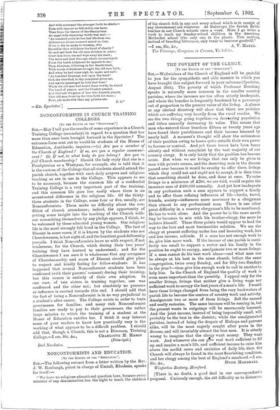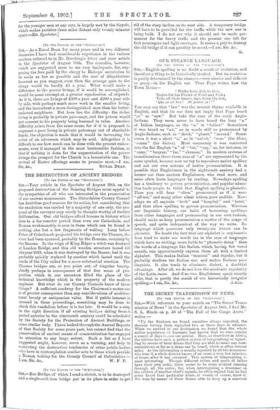THE POVERTY OF THE CLERGY.
[To THE EDITOR OP THE " SPECIAT0e1 STR,—Wellwishers of the Church of England will be grateful to you for the sympathetic and able manner in which you have brought this subject forward in your columns (Spectator, August 30th). The poverty of which Professor Beeching speaks is naturally more common in the smaller country parishes, where the incomes are too often utterly inadequate, and where the benefice is frequently burdened by a parsonage out of proportion to the present value of the living. A glance at any clerical directory will show that there are parishes which are suffering very heavily from the rural exodus. We see the two things going together,—a decreasing population and tithes annually decreasing in value. This means that men who entered these benefices fifteen or twenty years ago have found their parishioners and their income lessened by nearly half. A moment's thought will show the seriousness of their position owing to losses quite outside their own power to foresee or control. And yet these losses have been borne silently and without complaint by the vast majority of our country clergy. It is only lately that the position has become acute. But when we see livings that can only be given to men with private means, and the deserving men in the diocese passed over because it would be cruelty to offer them livings which they coup not and ought not to accept, it is then time that something should be done, and done at once. To raise livings to a minimum of £200, we are told, would require the immense sum of £400,000 annually. And yet how inadequate in any profession such a sum appears to support a family and to offer those refining influences of life—books, travel, friends, society—influences more necessary to a clergyman than almost to any professional man. There is one other great difficulty in a country clergyman's life to be mentioned. He has to work alone. And the poorer he is the more unwil- ling he becomes to mix with his brother-clergy, the more he isolates himself. These three points would appear to lead the way to the best and most businesslike solution. We see the clergy at present suffering under less and lessening work, less and less income, solitude. If a man has not enough work to do, give him more work. If the income of one parish is mani- festly too small to support a rector and his family in the position he ought to occupy, amalgamate two or more livings. If a man cannot do his best work alone—and what man can be always at his best in the same church, before the same congregation, twice every Sunday, and for fifty-two Sundays in the year P—then give him enough work to call in another to help him. In the Church of England the quality of work is even more important than the quantity. I appeal only for the smaller livings, livings that neither give a living wage nor sufficient work to occupy the best years of a man's life. I would have these livings changed from being the very backwaters of parish life to become the centres of country work and activity. Amalgamate two or more of these livings. Sell the unused and costly rectories. The same incomes will be coming in, but the present waste in outgoings will be enormously lessened. And the joint income, instead of being impossibly small, will probably be the best in the district; while the amalgamated parishes, instead of being the despair of Bishops and patrons alike, will be the most eagerly sought after posts in the diocese, and will invariably attract the best men. It is utterly wrong to imagine that the clergy want money. They want work. And whenever she can give real work sufficient to fill up and inspire a man's life, and sufficient income to raise him above the sordid cares and anxieties of daily life, then the Church will always be found in the most flourishing condition, and her clergy among the best of England's manhood.—I am, [There is, no doubt, a good deal in our correspondent's proposal. Curiously enough, the old difficulty as to distances.
for the younger men at any rate, is largely met by the bicycle, which makes parishes three miles distant only twenty minutes apart. —ED. Spectator.]







































 Previous page
Previous page